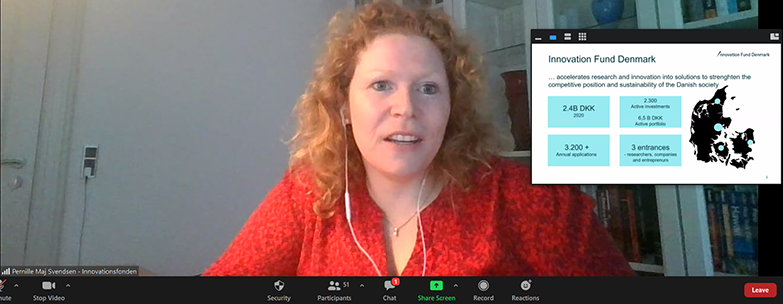Brew Your Own webinar presented expert tips on first funding
The first funding for a start-up almost always comes from friends, fools and families, but how does a start-up meet payroll when these run out of funds and patience? The webinar “Brew Your Own: First start-up funding” on January 19th 2021 presented two investors who told the audience what persuades them to release funding while two start-ups related their own experiences with finding and working with investors.
Understand what you are applying for
The Innovation Fund Denmark provides funding on friendly terms for maturation of research ideas, entrepreneurship and business start-ups. Pernille Maj Svendsen is a Programme Officer with the fund. She explained that the programmes Innofounder, Innoexplorer and Innobooster are specifically relevant for University students and staff. Their programmes aim to support a number of targets. These include research based business ideas, innovative entrepreneurship ideas and knowledge-based development projects in SMEs and start-ups. All in all the fund has 2,1 billion DKK to invest in 2021 and pride themselves on having a transparent and non-bureaucratic selection process. For the ambitious applicant Svendsen included three “pro tips” in her talk.
Read the guideline. Read the assessment criteria and Reflect so that you can answer questions about where your start-up is, where it needs to go and how it will get there”: Pernille Maj Svendsen, Programme Officer, Innovation Fund Denmark.
Always have an investor with time on his hands
As a business angel, Lars Arne Christensen has seen plenty of start-ups that were so desperate for funding, that they ignored an investor’s lack of qualifications. He is part of DanBan, which is one of Denmark’s largest networks of private investors for early stage companies. He feels that start-ups should only invite investors who can contribute with knowledge that will make the company successful. DanBan has around 400 million DKK per year to invest. In order to add insights to the financial investment, they work in teams- or syndicates- where at least one syndicate member pledges time to become a board member. DanBan is primarily interested in innovation intensive start-ups with proof of tech or concept, explained Christensen.
We especially like companies, where the idea is so sound, that the company could attract grants. That means that the start-up will run longer on the equity fuel”: Lars Arne Christensen, Business Angel, DanBan.
The Mom-test
It is toxic for a start-up when an early investor gets a too large slice of the pie because it leaves very little of value for later and larger investors. Mads Ørbæk Andersen and Kasper Storm Køppen are co-founders of the company VIOBAC. They avoided this trap by making sure the value of the company had grown significantly before each new round of investments. Viobac is developing a device to prevent urinary tract infections caused by catheters. In the US alone, these infections cost 10 billion dollars per year so the two founders started attracting grants while they were still juggling med-school and start-up.
We are very conscious about why we need funding, what kind of investor we want on board and especially when we need the next infusion of capital. Because we started while we were still students, we needed to prove that we could pass milestones such as laboratory testing and that we could attract the right staff. Good pitches are essential for this. We recommend that a pitch should pass the mom-test. If you can explain the market need and the proposed solution to your mother – then the investors will understand it too”: Mads Ørbæk Andersen, COO and Kasper Storm Køppen, CEO, VIOBAC
Only take on investors who are prepared to do shitty work
A completely different approach to investors is to get your customers to fund your development. Carl-Emil Grøn Christensen is the CEO and Co-founder of Reshape Biotech and for a while, his company did just that. Reshape is marketing the world’s first inexpensive robot to take over repetitive tasks in biotech labs. This idea had such immediate resonance with potential customers, that Reshape was able to sell minimum viable products instead of raising money from investors to fund initial research and development. When they finally did go looking for investors, they decided to think big.
Valuations of companies are ten times higher in the US than in Denmark, so we decided to try raising money internationally. Applying to international accelerator programmes and international investors is scary, but so much worth it. We were accepted by one of the most prestigious accelerators in the world, and they helped us find an investor, who has recently built his own unicorn start-up. That being said: If an investor wants to trade insight for equity, I would always ask, if he is also prepared to do any of the shitty work”: Carl-Emil Grøn Christensen, CEO, Reshape Biotech.
Information, inspiration and motivation
Brew Your Own-events are co-created by Copenhagen Science City and Danish Life Science Cluster. The events aim to provide information, inspiration and an opportunity to network. The hope is to strengthen bonds between researchers and students who dream of starting a business or working for start-ups and founders who have already realized the dream.




